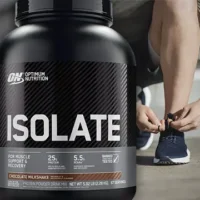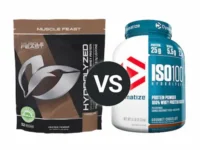Knowledge BaseYou're Questions Answered
BACK
How much protein should I use after a workout?
The amount of protein powder you should take after a workout is influenced not only by factors such as your weight and exercise intensity but also by the type of protein and its digestibility. It's essential to consider that the human body has limits on how much protein it can effectively absorb and utilize at one time.
Understanding Protein Absorption:
- Type of Protein: Different protein sources are absorbed at different rates. Whey protein, for instance, is rapidly absorbed, making it ideal post-workout for quick muscle repair. In contrast, plant-based proteins such as pea or rice protein digest more slowly and may provide a steady release of amino acids.
- Absorption Limits: There is a limit to how much protein the body can utilize effectively in one sitting. For most individuals, 20-25 grams of high-quality protein after a workout is sufficient to maximize muscle protein synthesis. Consuming more than this amount can be less effective, as the excess protein may not be used efficiently for muscle repair.
Practical Application:
For optimal post-workout nutrition:
- Choose Your Protein Wisely: Select a protein type that aligns with your dietary preferences and absorption characteristics. Whey protein is generally recommended for immediate post-workout consumption due to its fast absorption rate.
- Monitor Total Intake: Aim for a post-workout shake that provides about 20-25 grams of protein. If you prefer plant-based proteins, consider combining different sources to ensure a complete amino acid profile and enhance overall absorption.
- Spread Protein Intake: Rather than consuming a large amount of protein at once, it's more beneficial to distribute protein intake evenly throughout the day. This approach can help maintain a constant supply of amino acids to your muscles, supporting ongoing repair and growth.
While post-workout protein is important, ensuring that you receive adequate protein throughout the day is equally vital for muscle recovery and health. Balancing your protein intake can help maximize the benefits of your workouts and support your overall fitness goals.
Was this answer helpful? Let us know!
Like
References:
- Phillips, S. M. (2014). A brief review of higher dietary protein diets in weight loss: a focus on athletes. Sports Medicine, 44(S1), S149-S153.
- Witard, O. C., Jackman, S. R., Breen, L., Smith, K., Selby, A., & Tipton, K. D. (2014). Myofibrillar muscle protein synthesis rates subsequent to a meal in response to increasing doses of whey protein at rest and after resistance exercise. The American Journal of Clinical Nutrition, 99(1), 86-95.
Add to this Answer
Related Questions

Disclosure
Your Answer
Do you have a suggestion to improve the answer? Please detail your suggestions and provide any references to information that may support your answer if available.
The content on this site has not been written, reviewed or endorsed by a medical professional. We assume no liability for the misuse of supplements and recommend you review the label of any product, as well as consulting with your health care professional.
We are a participant in the Amazon Services LLC Associates Program, an affiliate advertising program designed to provide a means for us to earn fees by linking to Amazon.com and affiliated sites.
We are a participant in the Amazon Services LLC Associates Program, an affiliate advertising program designed to provide a means for us to earn fees by linking to Amazon.com and affiliated sites.
© 2025 ProteinPowder.com





